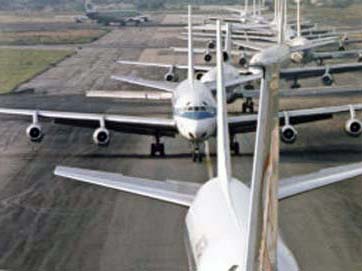What happens in Washington, DC, makes a giant difference to travelers. Everything from the taxes they pay on airline tickets, fees for customs and border protection, money for TSA inspections, and charges to take off and land at airports, all are decided in Washington, DC. And, they all come to a head in the FAA funding bill that is currently up for considerations.
Where newspaper headlines were filled with how bipartisan the work toward the new highway bill has been, many might have expected a similar bipartisan love fest when it came to the passage of the air transportation bill. But, there has hardly been a moment where any affection, even within political parties, has been evident.
After a horrific series of 23 extensions before the passage of the previous FAA bill, the mantra in Washington and of consumer groups led by Travelers United was no more extensions. Consumer leaders met with airline lobbyists and thought they had reached a consensus to move forward with a noncontroversial bill that kept the development of the new air traffic control system moving forward. That agreement included a provision to examine a new air traffic organization in a special committee and bring the concept to a vote with the following bill coming up in another five years.
However, the chairman of the House Transportation and Infrastructure Committee, in a quest to be transformational, made the redesign of the Federal Aviation Administration and the air traffic control system in the USA a core element in his new FAA bill. All experts agree that the biggest obstacles to the modernization of the air traffic system are repeated extensions of recent FAA bills that bring all progress to a complete halt. Chairman Shuster decided about five months before the expiration of the previous bill to launch an all out effort to redesign the air traffic organization.
That decision has already resulted in one extension and now after the introduction of the House version of the FAA bill, the congressional uproar is palpable. The infighting has spread beyond the normal partisan sniping. Even Republicans can’t agree with Republicans, Democrats with Democrats and unions with unions. Everyone seems to have a beef.
So, what are consumer to do?
Travelers United, after working quietly with the House Aviation Subcommittee staff for about two years, found some excellent provisions. Baggage fees were to be refunded when bags were not delivered within 24 hours of a flight. Consumer rights were to be publicized by airlines in order to help passengers get what was theirs. An app was to be developed for DOT to let passengers file complaints right from smartphones. And, the Advisory Committee for Aviation Consumer Protections was extended, providing consumers a strong committee with influence in the aviation world.
Of course there is more that can be done. As the bill is moving toward the Senate floor, Travelers United is working on having Senators ready to offer amendments controlling the runaway costs of change and cancellation fees, the need for humane personal space on airplanes, justifications for continuing fuel surcharges in an era of rock-bottom oil prices.
Another issue is the creation of a committee to study the future of drones across America — the FAA cannot figure out how to modernize an air traffic control system dating from the 1960s. It is absurd to think that this same administration can handle developing a semi-futuristic blueprint for controlling drones shooting videos, checking out power lines, assessing bridge strength, tracking cattle, spraying farmlands, as well as delivering packages in cities and to far flung rural addresses.
A team of experts, futurists, academics, industry wonks, IT professionals, unmanned aerial vehicle manufacturers and users needs to do a deep dive into what future low-altitude traffic management systems and drone registration might look like. Also, a system of state and local control and enforcement needs to be envisioned and created over time.
Is there a path forward?
With the rancor created by this “transformational” FAA bill, the Senate has an opportunity to write a bill that keeps its eye on modernizing the technology portion of the air traffic control system. The bureaucratic organization can be let go until the next congressional review in 2022. But, holding the entire aviation traffic system hostage to a bureaucratic brouhaha over organization is not in the interest of America’s public.
Travelers United urges the Senate move forward with a bill that deals with the FAA reality as it is today and continues with the development of the NextGen programs to bring new technology to our aviation system. The consumer group also is asking that this FAA bill be used to review the effects of antitrust immunity and the disporportionate concentration of takeoff and landing slots on the competitive aviation landscape. Plus, an independent committee should be created to take a look into the development of unmanned aerial systems and their integration into our airspace over the next two to three decades.

Charlie Leocha is the President of Travelers United. He has been working in Washington, DC, for the past 14 years with Congress, the Department of Transportation, and industry stakeholders on travel issues. He was the first consumer representative to the Advisory Committee for Aviation Consumer Protections appointed by the Secretary of Transportation from 2012 through 2018.



